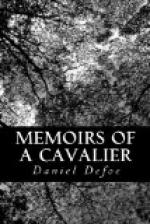(2.) Major-General Massey three times taken prisoner by them, and once wounded at Worcester.
(3.) Major-General Langhorn, (4.) Colonel Poyer, and (5.) Colonel Powell, changed sides, and at last taken, could obtain no other favour than to draw lots for their lives; Colonel Poyer drew the dead lot, and was shot to death.
(6.) Earl of Holland: who, when the House voted who should be reprieved, Lord Goring, who had been their worst enemy, or the Earl of Holland, who excepting one offence, had been their constant servant, voted Goring to be spared, and the Earl to die.
(7.) The Earl of Essex, their first general;
(8.) Sir William Waller;
(9.) Lieutenant-General Ludlow;
(10.) The Earl of Manchester;
—all disgusted and voted out of the army, though they had stood the first shock of the war, to make way for the new model of the army, and introduce a party.
* * * * *
In all these confusions I have observed two great errors, one of the king, and one of his friends.
Of the king, that when he was in their custody, and at their mercy, he did not comply with their propositions of peace, before their army, for want of employment, fell into heats and mutinies; that he did not at first grant the Scots their own conditions, which, if he had done, he had gone into Scotland; and then, if the English would have fought the Scots for him, he had a reserve of his loyal friends, who would have had room to have fallen in with the Scots to his assistance, who were after dispersed and destroyed in small parties attempting to serve him.
While his Majesty remained at Newcastle, the queen wrote to him, persuading him to make peace upon any terms; and in politics her Majesty’s advice was certainly the best. For, however low he was brought by a peace, it must have been better than the condition he was then in.
The error I mention of the king’s friends was this, that after they saw all was lost, they could not be content to sit still, and reserve themselves for better fortunes, and wait the happy time when the divisions of the enemy would bring them to certain ruin; but must hasten their own miseries by frequent fruitless risings, in the face of a victorious enemy, in small parties; and I always found these effects from it:—
1. The enemy, who were always together by the ears, when they were let alone, were united and reconciled when we gave them any interruption; as particularly, in the case of the first assault the army made upon them, when Colonel Pride, with his regiment, garbled the House, as they called it. At that time a fair opportunity offered; but it was omitted till it was too late. That insult upon the House had been attempted the year before, but was hindered by the little insurrection of the royal party, and the sooner they had fallen out, the better.




